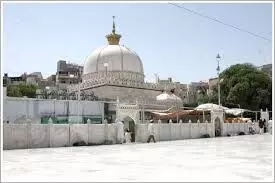Big Order on Ajmer Dargah Survey: Court Accepts Petition Claiming Shiva Temple; Issues Notice

Amidst the recent violence over the survey of Jama Masjid in Sambhal, Uttar Pradesh, now big news has come out about the survey of Ajmer Sharif Dargah in Rajasthan. The court has accepted the petition calling the Dargah a Shiva temple, for which a survey has been demanded for a long time. Civil Court (West) Judge Manmohan Chandel, while accepting the petition, has considered the matter worthy of hearing.
In the petition, a demand has been made to conduct an ASI survey of the Dargah, so that it can be ascertained whether the place of the Dargah was a Shiva temple earlier or not. Judge Manmohan Chandel said that notices will be issued to the Ajmer Dargah Committee, Minority Department and ASI in this matter.
Hindu Sena National President Vishnu Gupta had filed a petition in Ajmer Civil Court West, claiming that Sankat Mochan Shiva temple was in place of Ajmer Khwaja Garib Nawaz's Dargah. Lawyers Ramniwas Bishnoi and Ishwar Singh presented arguments before the court in favour of this petition on Wednesday.
It is worth noting that the Hindu Sena has claimed that the current Dargah site was a Shiva temple earlier. Hindu Sena national president Vishnu Gupta has made this claim citing Har Vilas Sharda's book published in 1910 and other documents. He presented evidence to prove the historical existence of the temple and demanded a survey of the dargah.
On behalf of the child form of Lord Shiva, the lawyers argued in the court that there was a Shiva temple here before the dargah. Documents and historical evidence were presented in support of this. The lawyers requested the court to return this site to the Hindu society for worship. It was argued that historically this site was known as Sankat Mochan Temple.
The hearing of this case has been scheduled for November 27. The lawyers urged the court to conduct a complete investigation and survey of this site so that historical facts can be brought to the fore. This dispute is related to religious faith and historical beliefs, on which the court's decision is awaited.

